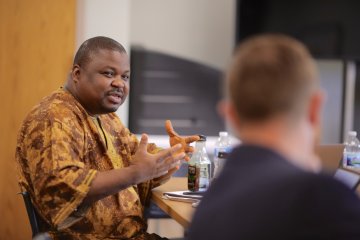Finding Elders in Immigrant Churches
 Luis Cardenas
Luis CardenasLike many churches in an immigrant context, our congregation ministers in a largely bilingual community. The older generation prefers to speak Spanish, while the younger prefers English. It's not unusual to hear two languages in a single conversation, with both parties understanding one another.
The differences in language preference are part of larger cultural differences seen in the community and our local church. These differences raise some important considerations for how immigrant churches should go about finding shepherds.
God's Plan for Church Leadership
With all the logistical complications that a bilingual culture brings, churches can be tempted toward pragmatism (doing what "works") without considering the biblical instructions for church leadership. Having only one church leader may seem to simplify things, but that is not the example given in the New Testament. The apostolic pattern and teaching are that local churches should be under the leadership of a plurality of qualified men, also known as elders (Acts 14:21-23; Titus 1:5; 1 Timothy 5:17; James 5:14; 1 Peter 5:1–2). Together, these men lead the congregation toward maturity in Christ.
Paul's instruction in 2 Timothy 2:1–2 reminds leaders that they must raise up leaders for future generations. However, they shouldn't be hasty in appointing them (1 Timothy 5:22). In his letters to Timothy and Titus, Paul lists the qualifications of elders (1 Timothy 3:1–7; Titus 1:5–9): they must have a desire to serve, a character worthy of imitation, and an ability to teach. Rather than being impractical or outdated, these biblical qualifications provide a helpful framework for identifying faithful shepherds for any church, including immigrant churches.
“Rather than being impractical or outdated, these biblical qualifications provide a helpful framework for identifying faithful shepherds for any church, including immigrant churches.”
A Model Citizen
Hebrews 13:7 calls church members to imitate their leaders. That is why elders must be above reproach (1 Timothy 3:2). Paul is not saying an elder must be without sin, but he is saying that his life must be free of any stain that would tarnish the testimony of Jesus Christ.
One crucial consideration for immigrant churches here is the immigration status of the leaders. This can be a tricky issue, so elders need to think critically about how to obey Christ's commands.
There are no biblical requirements for elders to be citizens of the nation in which they minister, but there is biblical instruction for Christians to be subject to the governing authorities (Romans 13:1; 1 Peter 2:13–17; Titus 3:1). That submission, however, has limits. The Bible provides instances where righteous men disobey civil authorities in obedience to God (see Acts 5:29, Daniel 3:10–18). This doesn't mean that we can disobey the government whenever we like, even when we believe a law is motivated by sinful intent. Peter instructed slaves to submit to harsh and unjust masters (1 Peter 2:18) because this demonstrates righteousness and leads others to glorify God (1 Peter 2:11–12).
Applying these principles to citizenship, elders must model submission to the government and God when appointing new elders. A man flagrantly disobeying government restrictions should not be considered. If the church leaders believe there are grounds for disobeying the government in some regard, those principles need to be communicated clearly and thoughtfully to the congregation.
A Model Family and Home
The qualifications for elders place particular emphasis on a man's ability to lead and manage his household. This characteristic is especially significant in an immigrant context because immigrant fathers may be tempted to maintain some distance from their children, especially when they become teenagers. This distance may be rooted in generational and cultural differences, but churches cannot settle for the status quo when it comes to parenting. The men being affirmed as leaders should be humble and bold enough to be invested in their children's lives. And that investment should produce visible fruit.
Another vital qualification for elders is hospitality. In an immigrant setting, this would mean looking for a man who has a history of connecting with people in both cultures, even if he doesn't speak both languages. Though language barriers will inevitably exist in an immigrant setting, there will also be bilingual people who can translate. Even if a church does not require a man to be immersed in two (or more!) cultures, they should not consider someone who refuses to extend himself to others outside his own culture.
A Model Teacher
The ability to teach is the capacity to convey biblical truth to an audience in a way they readily understand. A good teacher will adjust the delivery (not content!) of a message based on the audience. Missionaries in a foreign context must consider this, and so should shepherds in an immigrant context.
Prospective elders who will minister in immigrant contexts should demonstrate effectiveness dealing with people from other cultures. For those who are completely new to a culture, that ability will take time and humility to develop. Because of the differences between cultures, one man's leadership or communication may come across as insulting or detached. For example, insisting that Sunday service start right on time may be perceived as rigid or stuffy by one culture, while another culture may look down on leaders when worship services regularly begin five or ten minutes late. These kinds of cultural factors take patience and grace to navigate well.
In her book The Culture Map, Erin Meyer details different ways cultures communicate, conceive of leadership, make decisions, and perceive time and schedules. A shepherd doesn't have to master sociology, but he should be sensitive to cultural differences in order to better care for his sheep. Biblical elders should embrace the distinct challenges of an immigrant context, viewing them as opportunities to put the varied grace of God on display (1 Peter 4:10).
A Model of Unity
The New Testament calls local churches to preserve and pursue unity, so leaders must make this a priority. As new shepherds are appointed, the current elders need to be careful not to sacrifice unity for the sake of efficiency. If elders speak a different language, meetings may require a translator, and decisions may require more time to reach agreement. But that's not bad.
Elders can also demonstrate unity by taking intentional steps to learn one anothers' languages. While we do not want to add a language requirement to the biblical criteria, steps like these promote unity and build camaraderie.
A united eldership is a powerful force in a local church. As pastors are faithful to shepherd those in their care and train new leaders, Christ will continue to make sure His church is supplied with more leaders eager to equip the saints for the work of ministry (Ephesians 4:11–12).
Luis Cardenas serves on the pastoral team of First Bilingual Baptist Church in Pico Rivera (southern California). He received his M. Div. from The Master's Seminary and is a ministry partner with TLI's Diaspora Training.



